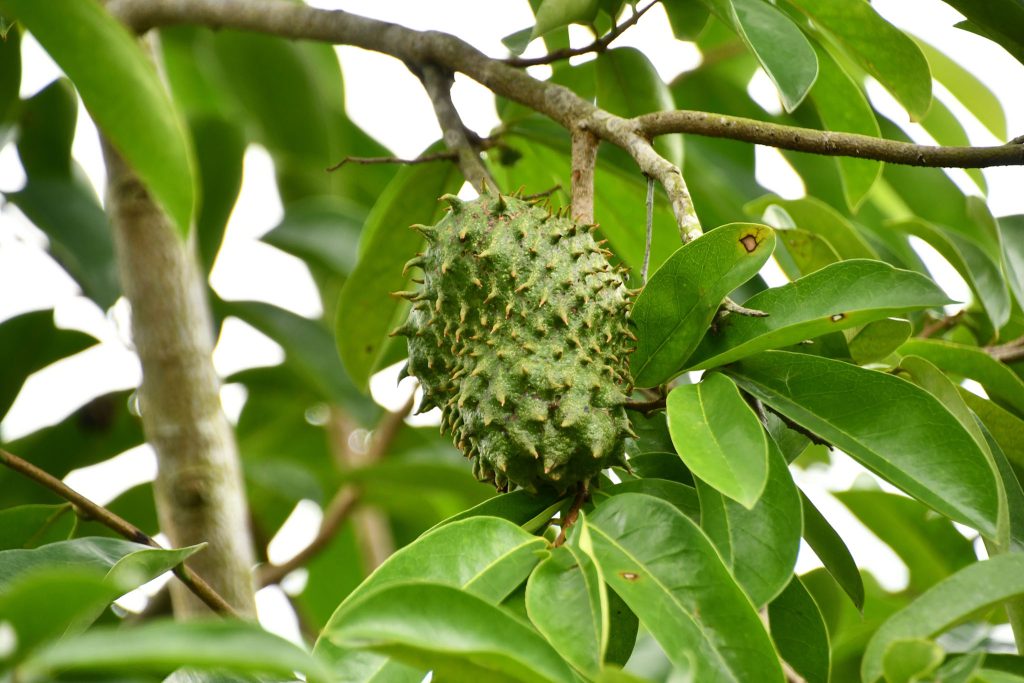Soursop
Scientific name: Annona muricata
Common names: Soursop, Jackfruit, Pawpaw, Corossol, Guanábana

Soursop, with its delicious fruit and potential health benefits, continues to be valued and enjoyed in tropical regions around the world. Whether savored fresh or incorporated into culinary creations, soursop remains a cherished part of tropical cuisine and culture. As ongoing research sheds light on its medicinal properties, soursop may continue to be explored for its potential role in promoting health and well-being.
Soursop, scientifically known as Annona muricata, is a tropical fruit tree native to the Caribbean, Central America, and parts of South America. It belongs to the Annonaceae family, which includes other fruits like cherimoya and custard apple. Soursop is renowned for its large, spiny green fruit, which has a sweet and tangy flavor and is prized for its culinary and medicinal uses.
Soursop trees are small to medium-sized evergreen trees that typically reach heights of 5 to 10 meters (16 to 33 feet). They have dense, bushy canopies with large, glossy green leaves that are oval or elliptical in shape. The tree produces distinctive, heart-shaped fruits that can weigh anywhere from 2 to 5 kilograms (4 to 11 pounds) or more. The outer rind of the fruit is covered in soft, spiky protrusions, giving it a rough texture.
The trees produce large, aromatic flowers that are yellow-green in color and have a unique, tropical fragrance. The flowers are typically solitary or in small clusters and have three outer petals and three inner petals. They are pollinated by beetles and other insects, which are attracted to their strong scent. The fruit is the most well-known and sought-after part of the plant. It is commonly consumed fresh or used to make juices, smoothies, ice creams, and desserts. The flesh of the fruit is creamy and white, with a sweet and tangy flavor reminiscent of a combination of pineapple, strawberry, and citrus. The fruit contains numerous black seeds embedded within the flesh.
Soursop fruit is a popular ingredient in tropical cuisine, where it is used to make a variety of sweet and savory dishes. In addition to being eaten fresh, soursop is used to make refreshing beverages such as juices, shakes, and cocktails. It is also used to flavor desserts such as ice creams, sorbets, and puddings. In some cultures, the leaves of the soursop tree are also used to impart flavor to cooking.
Medicinal uses:
Soursop has a long history of traditional use in herbal medicine, particularly in the regions where it is native. Various parts of the soursop tree, including the fruit, leaves, seeds, and bark, have been used for their purported medicinal properties. While scientific research on its medicinal uses is ongoing, soursop continues to be valued for its potential health benefits.
Soursop is rich in antioxidants, such as vitamin C, flavonoids, and alkaloids, which help neutralize harmful free radicals in the body. These antioxidants may help reduce oxidative stress and inflammation, potentially lowering the risk of chronic diseases such as heart disease and cancer
Some studies suggest that soursop may have immune-boosting properties due to its high content of antioxidants and other bioactive compounds. Consuming soursop fruit or its extracts may help strengthen the immune system and enhance the body’s ability to fight off infections and diseases.
Soursop has gained attention for its potential anticancer properties, with some studies suggesting that it may inhibit the growth of cancer cells and induce apoptosis (programmed cell death) in certain types of cancer. Several compounds found in soursop, such as acetogenins, have been studied for their potential anticancer effects.
In traditional medicine, soursop has been used to promote digestive health and alleviate gastrointestinal issues such as indigestion, bloating, and constipation. It is believed to have digestive-stimulating properties and may help improve digestion and relieve discomfort.
Extracts from soursop leaves and fruit may have anti-inflammatory properties, which could help reduce inflammation and alleviate pain associated with conditions such as arthritis, rheumatism, and inflammatory bowel disease.
Soursop is believed to have cardiovascular benefits, including lowering blood pressure, reducing cholesterol levels, and improving circulation. These effects may help reduce the risk of cardiovascular diseases such as hypertension and atherosclerosis.
Topical application of soursop extracts or preparations may help improve skin health and treat various dermatological conditions such as acne, eczema, and psoriasis. Soursop contains compounds that have been studied for their potential antibacterial and anti-inflammatory effects on the skin.